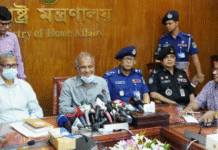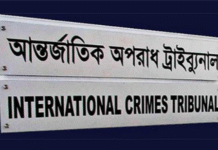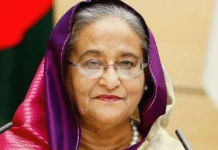EU delegation tells star, stresses consensus among political parties, points out poor safety at RMG units
Bangladesh has emerged as a huge success story and benefited most as a least developed country from preferential market access to Europe, William Hanna, ambassador and head of delegation of EU to Dhaka, said yesterday.
The country gained from WTO Director-General Pascal Lamy’s theory: Make no trade barriers for the least developed countries, Hanna said during a discussion at The Daily Star Centre in the capital.
“But many countries don’t have productive capacity and human resources and don’t have investments to benefit from that. But Bangladesh has shown it can do it,” he added.
“Of all the least developed countries that have duty-free access to the European market, Bangladesh has benefited the most.”
In Bangladesh, investments came from inside, through remittances. It has built up factories linking up with buyers and creating millions of jobs and increasing exports to a market even when there is a downturn, the EU envoy said.
“It’s a huge success story.”
William Hanna led a delegation, which includes Danish Ambassador Svend Olling, Swedish Ambassador Anneli Lindahl Kenny, Babou Kamichetty, France embassy’s deputy head of mission, and Dr Ralf Matthias Reusch, German embassy’s deputy chief of mission.
EU Attaché in Dhaka Pierre Buysschaert was also present at the discussion, moderated by Mahfuz Anam, editor and publisher of The Daily Star.
The envoys talked on a wide range of issues like the EU and how it comes into force, its structure, integration, EU’s action abroad to promote democracy, peace, prosperity, human rights, trade and investment and challenges and priorities in Bangladesh-EU relations and current political situation in Bangladesh.
Turning to political situation and controversy over the method of next general elections, Hanna said there has to be an agreement among the political parties on how to hold the next general elections.
The envoys said the EU’s yearly grant of 500 million euro to Bangladesh could increase in the coming years.
They added Bangladesh has further potential for the EU market access facility provided that it maintains standards, compliance and safety.
“There is a downside of every success. The Ashulia fire is an example,” Hanna said. “We are very concerned with the fire at an Ashulia factory. We’ve already sat with the buyers, workers and producers to discuss the issue.”
He said all the norms and ideas are there in Bangladesh, but these are not being applied. He blamed factory owners, government inspectors and buyers for the poor safety measures at the factories. “There are lots to be done, but we’ll be looking at self-regulations.”
On the EU’s aid rise, Hanna said Bangladesh will get a big allocation, but he would not disclose the sum.
Svend Olling, the Danish ambassador, said there are lots of debates going on in the EU about compliance and safety issues in Bangladesh’s factories. “Buyers and consumers are questioning, ‘should we buy from Bangladesh’.”
POLITICS, ELECTION
Replying to a question about current conflicting political situation and controversy over the method of next general elections, Hanna said there has to be an agreement among the political parties about how to hold the next parliamentary polls.
“For holding an election free, fair, inclusive and acceptable to all, it requires an agreement,” he said and added it is the people who have to decide under what arrangement the next general elections should be held.
Ambassador Hanna also said the EU is providing technical assistance to the Election Commission to facilitate a free, fair and acceptable election.
“We are preparing for sending pre-poll observers from the European Parliament like the last occasion,” he said emphasising that the modalities agreeable to all needed to be worked out first for ensuring fair polls.
The envoys regretted the recent violence and said they are very disturbed over the violent activities in Bangladesh.
“We are disturbed by the violence in Bangladesh. Violence is not the way forward,” Hanna said.
Referring to the killing of a youth during Sunday’s opposition sponsored blockade, Swedish envoy Anneli Lindahl Kenny said, “It is unfortunate that young people are resorting to such violence and innocent people are getting killed.”
The winner of 2012 Nobel Peace Prize, the EU is the largest economy with over one-fourth of the world’s gross domestic product. It also accounts for 35 percent of total export and import across the globe.
The EU granted duty-free and quota-free market access for all products, except arms, from all of the 48 LDCs in 2001.
Now over half of Bangladesh’s export goes to the EU; readymade garments, frozen shrimp, leather and leather goods, tea and pharmaceuticals are major products.
The country’s export to EU was 5,125 million euro in 2007 and rose to 8,585 million euro in 2011. Average growth in last five years was 13.8 percent.
Bangladesh’s import from the European Union also grew over the years. The country’s import from the EU was 1,002 million euro in 2007 and reached to 1,702 million euro in 2011 with an annual growth rate of 13.6 percent a year.
The EU’s main exports to Bangladesh are machinery, equipment, chemicals and transport goods.
Source: The Daily Star










